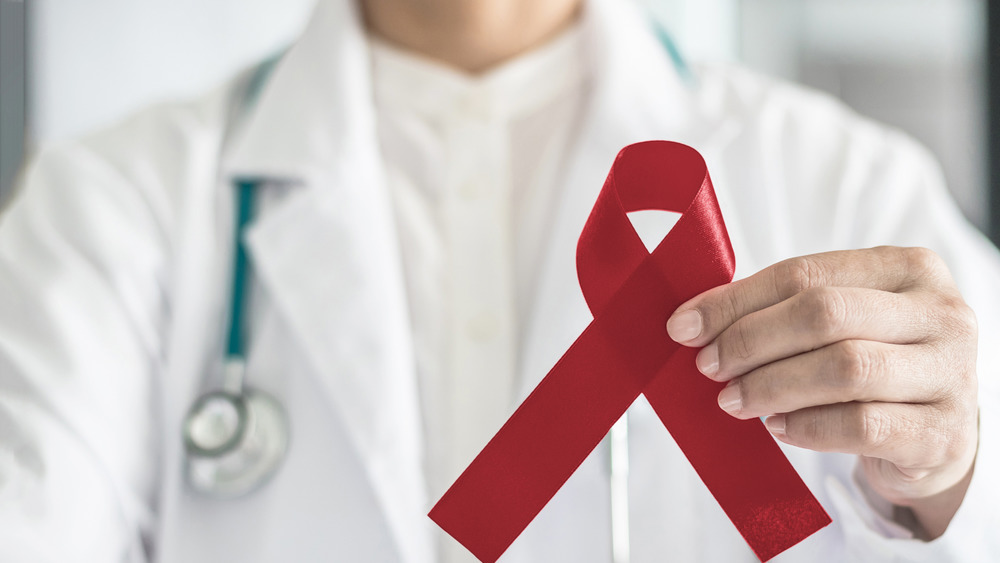What Are The Different Types Of Anemia?
Being anemic means your body doesn't have enough healthy red blood cells responsible for bringing oxygen to your organs and tissues. Anemia could be caused by not making enough red blood cells, your body destroying red blood cells, or bleeding that causes you to lose red blood cells quicker than your body can replace them.
Anemia can make you feel cold, tired, and weak. If you think you might have anemia, you need to see your doctor to determine the cause, type of anemia, severity, and treatment. The different types of anemia include iron deficiency anemia, sickle cell anemia, vitamin deficiency anemia, and thalassemia (via the Mayo Clinic and the Cleveland Clinic).
Common symptoms of anemia are fatigue, weakness, dizziness, yellowish or pale skin, headaches, irregular heartbeat (arrhythmia) or fast heartbeat, feeling cold, chest pain, shortness of breath, sore tongue, brittle or spoon-shaped nails, change in the sense of taste, hair loss, ringing in the ears, and involuntary leg movement (restless leg syndrome).
Iron deficiency anemia
Iron deficiency anemia could be caused by diet, poor iron absorption, blood loss, pregnancy, childbirth, or gastric bypass surgery (via the Mayo Clinic and the American Association of Hematology).
You may overlook iron deficiency anemia at first when it's mild, but as it worsens, the symptoms will show up. These can include weakness, fatigue (sometimes severe), pale skin, cold hands and feet, brittle nails, sore or inflamed tongue, headaches, dizziness, lightheadedness, fast heartbeat, and shortness of breath. You might also experience pica, a craving for non-food items like ice or dirt.
If iron deficiency is left untreated, it can cause growth problems in babies and children, low birth weight or premature birth, infections, and heart problems, but thankfully, an iron supplement can prevent these complications. A common cause of iron deficiency in babies and children is poor diet. Ensure your baby is getting enough iron with breastmilk or an iron-fortified formula for the first year.
Vitamin deficiency anemia is when you're deficient in vitamin C, B12, or folate. It could be due to poor diet or difficulty absorbing these vitamins. See your doctor for a proper diagnosis. Vitamin deficiency anemia can be treated with supplements and diet change, according to the Mayo Clinic.
Sickle cell anemia
Sickle cell anemia is an inherited disease. Healthy red blood cells are round and flexible, but in people with sickle cell anemia, some of their red blood cells are crescent or sickle-shaped and aren't flexible. According to the Mayo Clinic, these unhealthy red blood cells get stuck and slow or block blood flow and the transportation of oxygen to certain parts of the body.
Symptoms of sickle cell anemia are periodic episodes of pain, vision problems, frequent infections, swelling of hands and feet, and delayed growth or puberty. The symptoms are all caused by slowed or blocked blood flow and too few healthy red blood cells. Sickle cells die much faster than healthy red blood cells, which causes anemia. Healthy red blood cells live for about 120 days, while sickle cells only live for about 10 to 20 days.
Unfortunately, there is no cure, but treatments can help prevent complications and help with the pain. See your doctor if you have swollen feet or hands, a fever, severe pain (usually in the chest, abdomen, joints, or bones), abdominal swelling, yellowish nails, pale skin or nail beds, or any signs of stroke — weakness or paralysis on one side of your face, legs, or arms, severe headache, a sudden change in vision, numbness, difficulty talking or walking, or confusion. If you have stroke symptoms, get immediate emergency medical care.
Thalassemia
People with thalassemia don't have enough hemoglobin necessary for carrying oxygen to organs and tissues. Prevention isn't possible as this blood disorder is inherited. Symptoms include fatigue, weakness, abdominal swelling, dark urine, slow growth, facial bone deformities, and yellowish or pale skin. If you notice these symptoms in your baby, make an appointment with their pediatrician.
If you have mild thalassemia, you probably won't have symptoms and might not need treatment. Moderate to severe thalassemia requires treatment, which could be getting blood transfusions regularly.
There are two main types of thalassemia — alpha-thalassemia and beta-thalassemia, affecting hemoglobin molecules within the genes. Mutated genes cause alpha-thalassemia, and the severity of the blood disorder depends on how many of those genes are mutated — one, two, or three. Having four mutated genes is rare as it usually results in stillbirth. One or two mutated genes cause beta-thalassemia (via the Mayo Clinic).




